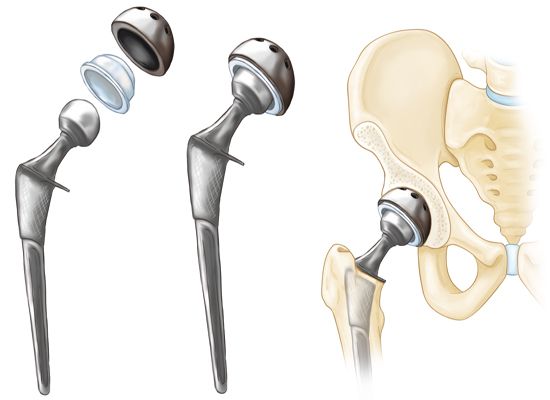- Home
- Hip Replacement Surgery
Hip Replacement Surgery
What is hip replacement surgery?
Hip replacement is the removal and replacement of portions of the pelvis and femur (thighbone) that form your hip joint. It is performed primarily to relieve hip pain and stiffness caused by hip arthritis.
This procedure is also sometimes used to treat injuries such as a broken or improperly growing hip, and for other conditions. Hip replacement is highly successful surgery in which portions of the hip joint are replaced with prostheses (implants).

Hip replacement surgical methods
There are two major surgical approach methods for performing a total hip replacement:
- the posterior approach (more common)
- the anterior approach (sometimes called the “mini-anterior approach” or “muscle-sparing hip replacement”)
To begin the operation, the hip replacement surgeon will make incisions on either the back (posterior) or front (anterior) of the hip. Both approaches offer pain relief and improvement in walking and movement within weeks of surgery.
BOOK AN APPOINTMENT
You Don't Have To Live With Pain
Dr. Rahul Bade is a specialist Knee & Shoulder Surgeon.
What is hip replacement surgery recovery like?
Your rehabilitation will begin within 24 hours after surgery. Most hip replacement patients progress to walking with a cane, walker or crutches within day or two after surgery. As the days progress, you will increase the distance and frequency of walking.
If you have THR surgery at HSS:
- Your recovery will begin directly following surgery in the Post-Anesthesia Care Unit (PACU), where your medical team will manage your pain and monitor your vital signs.
- Once the anesthesiologist is satisfied with your condition, you will be moved to an inpatient recovery room to monitor your progress.
- The pain management team will assess your medication and use a multifaceted approach to ensure comfort and mobility during the rehabilitation process.
- You will begin rehabilitation with a physical therapist within 24 hours. Your therapist will help you sit up, get in and out of bed, and practice walking and climbing stairs using a walker, cane or sometimes crutches.
- You will then continue physical therapy outside the hospital for 6 to 8 weeks. After that period, most patients are able to do everyday activities and return to playing sports.
How long do hip implants last?
Generally speaking, a hip replacement prosthesis should remain effective for between 10 and 20 years, and some can last even longer.
Results vary according to the type of implant and the age of the patient. In a 2008 study of more than 50,000 patients who had THR surgery at age 55 or older, between 71% and 94% still had well-working implants after 15 years. When a hip implant does need to be replaced because it has loosened or worn out over time, this requires what is called hip revision surgery.


